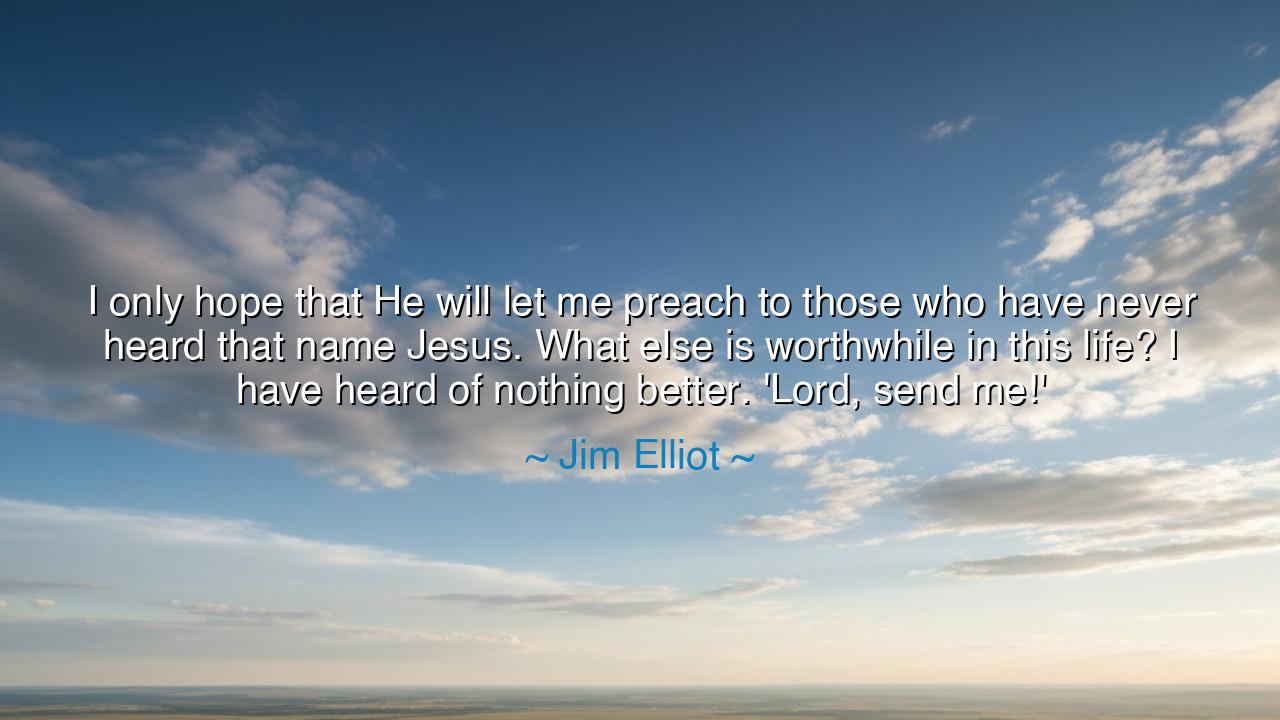
I only hope that He will let me preach to those who have never
I only hope that He will let me preach to those who have never heard that name Jesus. What else is worthwhile in this life? I have heard of nothing better. 'Lord, send me!'






“I only hope that He will let me preach to those who have never heard that name Jesus. What else is worthwhile in this life? I have heard of nothing better. ‘Lord, send me!’” — these were the words of Jim Elliot, the young missionary whose heart burned with holy fire and whose life became a living testimony to faith and sacrifice. His words are not mere piety, but a cry from the depths of purpose — a voice that calls across time to remind us that the truest calling of humanity is not comfort, nor safety, but service to something greater than oneself.
In this saying, Elliot reveals the ancient yearning that has stirred in prophets, saints, and heroes since the dawn of belief — the desire to be sent, to go forth into darkness bearing light. His prayer is not for protection, nor for reward, but for permission: “Lord, send me.” In those three words lies the essence of courageous faith — a soul that would rather perish in divine service than live in vain comfort. It is the same fire that burned in Isaiah’s vision when he heard the voice of the Lord saying, “Whom shall I send?”, and answered, “Here am I. Send me.” Elliot’s echo of this ancient call binds his heart to the lineage of all who have lived and died for truth.
To understand his words, we must know his story. In the mid-20th century, Jim Elliot journeyed with four companions into the dense jungles of Ecuador, seeking to bring the message of Christ to the Huaorani people — a tribe known for their isolation and fierce resistance to outsiders. He knew the danger, yet he went gladly. To him, the call to preach was not a burden but a privilege — the purest expression of love. He once wrote in his journal, “He is no fool who gives what he cannot keep to gain what he cannot lose.” And so he went — not as conqueror, but as servant; not for glory, but for grace.
They reached the tribe in 1956, and for a brief moment, there was peace — laughter, exchange, human connection. But fear and misunderstanding struck swiftly, and the tribesmen killed the missionaries on the riverbank. The world looked upon their deaths as tragedy. Yet to Elliot, death was no defeat, for he had already surrendered it. He had said, in life and in word, that there was nothing more worthwhile than to carry love to those who had never known it. His death became his sermon — his blood, his testimony. And in the years that followed, the Huaorani themselves came to embrace the message he had carried, led by the wives and sisters of the very men who had fallen. Thus, his prayer was answered — not through his survival, but through his sacrifice.
In these words — “What else is worthwhile in this life?” — Elliot touches a truth deeper than doctrine. He reminds us that meaning is not found in what we possess, but in what we pour out. To live for oneself is to shrink into nothing; to live for others, for faith, for love, is to transcend mortality. His question cuts to the soul: What, indeed, is worth our days upon this earth? Wealth fades, fame crumbles, pleasure vanishes — but service, devotion, and courageous love endure.
Elliot’s cry, “Lord, send me!” is the prayer of every soul that longs to matter. It is not a request for glory, but a surrender of will — a readiness to step into the unknown, to bear light where darkness reigns. Each of us, though not all are called to the mission field, carries within the same calling: to serve where we are, to bring hope where there is despair, to speak peace where there is hatred. To live without such purpose, Elliot would say, is a kind of living death — for what is life, if not the giving of it for something eternal?
So let this be the lesson carried forward: that the worth of life is measured not in years lived, but in love given and truth served. When you hear the quiet whisper within you, calling you toward goodness — whether in distant lands or in the humble duties of home — answer as Elliot did: “Lord, send me.” For every heart that answers this way becomes a light against the night, a vessel through which the divine reaches the forgotten and the broken.
And so, dear listener, remember this: to be sent is to live fully. To serve is to reign. And when you give yourself in the name of love — whether to one soul or to many — you have already touched eternity. Jim Elliot’s life may have ended upon a foreign shore, but his prayer continues across generations, calling us to rise, to give, to go. For truly, there is nothing better — no greater joy, no higher calling — than to be a willing instrument of hope in the hands of God.






AAdministratorAdministrator
Welcome, honored guests. Please leave a comment, we will respond soon